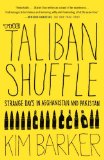Summary | Excerpt | Reviews | Beyond the Book | Readalikes | Genres & Themes | Author Bio

Strange Days in Afghanistan and Pakistan
by Kim Barker
After living through all this plus the fall of the Taliban regime, Farouq behaved much older than I did. He seemed forty, even though he was only twenty-six. He took care of at least ten relatives, from nieces and nephews to his parents and a disabled sister. Farouq hadn't planned to go into journalism, or to become a "fixer," a foreign journalist's paid best friend, the local who interpreted, guided, and set up interviews. He wanted to be a surgeon. But he would have earned a paltry $100 a month as a doctor. With us, he made $50 a day. All the young English-speaking doctors and medical students had started working with foreign journalists, who probably single-handedly eliminated a generation of doctors in Afghanistan.
Luckily, Farouq, a barrel-chested former weightlifter with a mustache and thick black hair, was a natural journalist. He was intrepid and resourceful. He was eager, probably because he was single, and a single young Afghan man had little in the way of entertainment. It's not like Farouq could date or go to a bar. Kabul had no bars or dates, except for the edible kind. Farouq was also connected to the entire country—related to half, able to convince the other half to talk.
I told Farouq about my own life—kind of. I said I wanted to be a foreign correspondent—kind of. And at thirty-two, I wanted to get married to my serious boyfriend—kind of. Or maybe I wanted to do both. I was still working it out.
At one point, we wandered through the streets of Kabul—cold, gritty, fecal—to try to get some air. Afghans stopped us.
"What is she doing here?" more than one Afghan asked. "Didn't all the foreigners go to Iraq?"
I figured that could be a story, so we interviewed Afghans near the top of TV Mountain, so named because the TV stations had transmitters on top. Kabul was a very literal city: Butcher Street was where the butchers were, where slabs of questionable meat hung, covered with flies. Chicken Street was where chickens used to be sold, but Chicken Street had evolved into the tourist market, where in the 1960s hippies shopped for fur jackets, silver trinkets, and carpets. The market had tentatively reopened after the Taliban fled, selling the same fur jackets and silver trinkets and carpets from thirty years earlier, only to foreign aid workers and soldiers and journalists instead of hippies.
On TV Mountain, the Afghans almost spat out their rage about feeling abandoned. "Believe me—the Americans lost in Afghanistan as soon as they left for Iraq," one man said. Or maybe he said "believe me"—I was learning that this phrase was one of Farouq's trademarks, along with "I'm telling you." I just smiled and nodded. Afghans were as sensitive as a teenage girl about the civil war that happened after the Soviets fled in the late 1980s, when the Americans left the last time around. I wrote a story, but the newspaper had no space. The indignities piled up. My computer keyboard started failing, letter by letter. My satellite phone was broken, and I had no way to get online except for Kabul's Internet cafés. I had to fudge receipts for a new Thuraya satellite phone because we weren't supposed to buy new equipment—all the money was being spent on Iraq. I was starting to really hate that war.
Like any journalist trying to push her way into the newspaper, I figured more action was the answer. Once again, Farouq and I hit the road. We flew to Kandahar, the onetime Tali-ban stronghold in the south and the second-largest city in Afghanistan, near where the fighting was the worst. We walked onto the tarmac and found our Kandahar driver near a statue that resembled a giant soccer ball. He took us immediately to a boys' school that had just been burned down by members of the Taliban, who destroyed cookies sent by India and called the headmaster "son of Bush." Then, with the sun sinking and our driver panicking about me wearing glasses in a dicey neighborhood, as glasses were a clear sign I was a foreigner, we drove to our hotel, where my bathroom had been defiled by someone days earlier.
Excerpted from The Taliban Shuffle by Kim Barker. Copyright © 2011 by Kim Barker. Excerpted by permission of Doubleday, a division of Random House, Inc. All rights reserved. No part of this excerpt may be reproduced or reprinted without permission in writing from the publisher.
Your guide toexceptional books
BookBrowse seeks out and recommends the best in contemporary fiction and nonfiction—books that not only engage and entertain but also deepen our understanding of ourselves and the world around us.